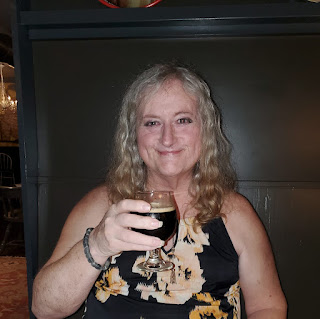Being a Late Bloomer
Or should I say a "late boomer" since I was born in 1949, I firmly fall into the "Boomer" generation. One of the things which disappoints me the most is when a younger transgender person tries to say I (or anyone else) who transitioned later in life are somehow less trans as their younger counterparts.
 |
| Happy Holidays! |
I did attend and ironically did learn I was still different than many of the others who attended. There were those who seemingly used the opportunity to wear a dress to overstate their masculinity. In the days preceding "Urban Cowboy" and cis women smoking cigars, these cross dressers decided a big cigar, no makeup and a cowboy hat were their best feminine accessories. On the other hand, there were the attendees who looked impossibly feminine. I found myself between the two. Most certainly I did not identify with the cigar smokers but was not accepted by the so called "A" Listers. I had a ways to go with my feminine presentation but I was trying. Even though I didn't particularly appreciate their attitude, the "A" girls couldn't wait to expand the cross dressing party out of the hotel and into the world. I knew that was where I wanted to be, even way back then.
I imagine when I did tag along, more than a few of the "A" girls looked down on me (an early form of being transer than I) but I persisted and learned. Slowly but surely I became accepted by a group in nearby Columbus, Ohio. Compared to a few of the others, I was still a late transgender bloomer even though I was just in my thirties. The whole experience gave me a regular outlet for my gender desires other than my yearly Halloween party. Plus being around the "A" girls really helped me to up my game and try harder to look more feminine. The only main problem I was having was I was happily married to a woman who knew I was a cross dresser but was careful to draw the line when I made any moves to advance to the next step which a few of my acquaintances were heading towards. A sex change operation as it was known back in those days.
My excuse in those days for my stopping my gender progression was I was happily married to a woman I loved, plus I was rapidly advancing in a job I had worked hard to obtain. In other words I had a lot to give up. In essence giving up a life we transgender persons of a certain age have worked to build is one of the main gender transition problems we face. It all is in direct opposition to the hurdles younger trans people face. They face building a life in a sometimes hostile world while we face giving up the living privileges we have gained over the years.
The key is understanding from all transgender women and men. Being a late bloomer is just another part of the process.
Comments